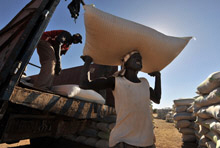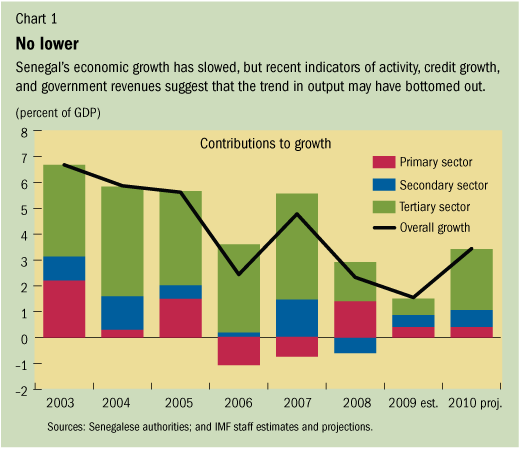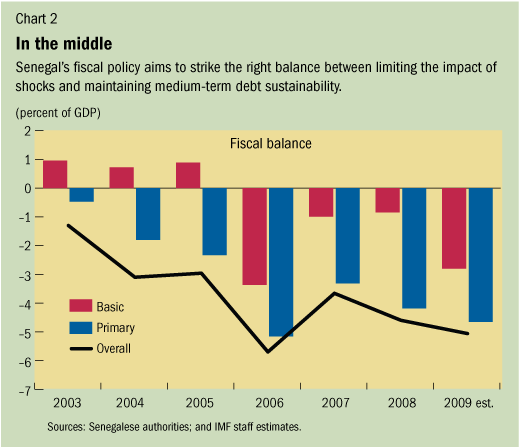
Typical street scene in Santa Ana, El Salvador. (Photo: iStock)
IMF Survey: Senegal Well Positioned to Regain Growth Momentum
May 26, 2010
- Senegal has started to recover from severe external shocks
- IMF financial support helped cover country's financing needs
- Normalized relations with private sector, more structural reforms keys to growth
With the right policies and quicker structural reforms, Senegal should be well positioned to regain its growth momentum.

Crew unloads rice in Dakar, Senegal, where improving nonprice competitiveness will be key to regaining growth momentum (photo: Georges Gobet/AFP)
ECONOMIC HEALTH CHECK
In its regular review of Senegal’s economy, the IMF also says it will be critical in the short term for the authorities to fully normalize relations with the private sector.
Following the food and fuel price shocks in 2008, Senegal’s economic activity slowed further in 2009 because of the global economic downturn and domestic shocks, including temporary electricity shortages. Lower external demand and downward pressure on remittances, tourism receipts, and foreign direct investment have slowed growth. Prior to the crises, medium-term economic growth was expected to average about 5½ percent, but Senegal’s annual growth averaged only about 2 percent during 2008–09 (see Chart 1 breakdown of Senegal’s primary or agricultural, secondary or manufacturing, and tertiary or services sources of growth).

Recent indicators of activity, credit growth, and government revenues suggest that economic growth may have bottomed out. Growth is projected to pick up to close to 3½ percent in 2010. Consumer price inflation, which was negative in the second half of 2009 due to international price developments and the absence of domestic demand pressures, is expected to return to its long-run trend.
However, some risks to the outlook persist and relate to unexpectedly subdued external demand, financing constraints that limit the room for fiscal maneuver, and renewed problems with electricity supply. Opportunistic changes in economic policies for political reasons could also dampen prospects.
Buffering the impact of shocks
Additional financing and broadly appropriate policies under an economic program supported by a three-year IMF Policy Support Instrument approved in November 2007, helped to cushion the impact of the external shocks of the past two years.
Facing shocks with a significant negative impact on the economy, Senegal requested IMF financial assistance in December 2008. The IMF Executive Board approved a one-year, $75.6 million arrangement under the Exogenous Shocks Facility (ESF) to help finance the balance-of-payments impact of higher food and energy prices. In June 2009, the Executive Board agreed to increase the ESF to about $192 million and to extend its duration from 12 to 18 months. The completion of the third and last review of the ESF on May 24, 2010 will allow Senegal to draw the last tranche of $47.7 million.
Fiscal policy aimed at striking the right balance between limiting the impact of the shocks and maintaining medium-term debt sustainability. A moderate and temporary rise in the fiscal deficit over the past two years to about 5 percent of GDP was appropriate to cope with falling tax collections and to maintain social spending and infrastructure investment (see Chart 2).

Regaining growth momentum
Several complementary policies need to be put in place to regain Senegal’s growth momentum and return the economy to previous growth trajectories.
• Gradually reducing fiscal stimulus: With signs of a pickup in activity, the fiscal stimulus should be gradually reduced to progressively achieve a medium-term fiscal deficit target of 4 percent of GDP, consistent with maintaining debt sustainability.
• Continued public financial management reforms: Significant progress has been made since late 2008, but further public financial management reforms remain essential for more effective expenditure control and planning. Investment projects should be selected and prioritized, based on rigorous economic cost-benefit analyses, to raise the productivity of government spending.
• Fully normalizing financial relations with the private sector: The authorities have made good progress in addressing past payment delays to the private sector. A swift and transparent settlement of remaining extrabudgetary spending and public institution and agency debt toward the private sector would support the economic recovery.
• Improving competitiveness through structural reforms: Improving nonprice competitiveness will be key to regaining growth momentum. Senegal needs to accelerate both structural reforms in the business environment and governance to improve the investment climate. In the energy sector, which is critical for growth, the plan, supported by the World Bank and other donors, needs to be implemented quickly to limit supply bottlenecks and fiscal risks, while allowing electrification to expand throughout the country. It is also essential to strengthen the institutional, legal, and operational environment of the financial sector to enhance the sector’s contribution to growth.
With a more favorable external environment, appropriate macroeconomic policies, and more expeditious structural reforms, Senegal should be well positioned to regain its growth momentum. In the short term, it will be critical to fully normalize relations with the private sector and avoid opportunistic changes in economic policies.


